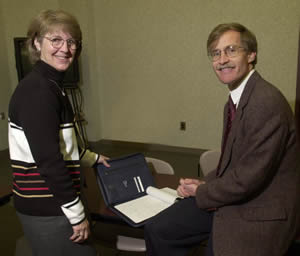Grant to help establish culturally sensitive training sites

Drs. Maria Clay and Doyle Cummings are overseeing a project aimed at serving migrant worker health needs. Photo by Cliff Hollis.
GREENVILLE, N.C. (Dec. 13, 2002) — The U.S. Department of Health and Human Services has awarded a $918,627 grant to the Eastern Area Health Education Center and the Brody School of Medicine at East Carolina University to help a variety of health sciences students learn how to provide quality care and communicate more effectively with Latino patients.
Four migrant health centers across eastern North Carolina will be developed as training sites for 180 students enrolled in clinical laboratory science, health education, health information management, medicine, nurse practitioner, nursing, nutrition, occupational therapy, pharmacy, physical therapy, physician assistant studies and social work. Students at ECU and nursing students from N.C. Central University in Durham and pharmacy and physical therapy students at Hampton University in Virginia will participate. The University of North Carolina at Chapel Hill will also collaborate with ECU on the grant program.
“We are ecstatic to have this opportunity to provide innovative training to our learners across the health sciences and to help reach some of the most vulnerable and underserved citizens in the region,” said Dr. Doyle “Skip” Cummings, who along with Dr. Maria Clay will oversee the grant implementation.
Cummings, a pharmacist, and Clay, director of clinical skills assessment and education, are co-directors of the Interdisciplinary Rural Health Training Program at the medical school. The four centers are TriCounty Community Health Center near Newton Grove in Sampson County, Goshen Medical Center near Faison in Duplin County, Greene County Health Care in Snow Hill and the Kinston Community Health Center in Lenoir County.
Program faculty include community-based members Bonita Harriett, Manuel Hyman, Pat Royal and educational specialist Kristen Springer-Dreyfus. “These individuals will collaborate with a large group of faculty from across the university to implement this innovative program,” Cummings said.
The grant funding will be spread over three years and comes from the federal Bureau of Health Professions Quentin Burdick Rural Interdisciplinary Training Program.
“The Institute of Medicine, the Association of Academic Health Centers and many professional societies are very supportive of the need to better prepare our students for the increasingly complex world of health care delivery,” Cummings said. “An interdisciplinary collaboration is the preferred model. As our society ages and the prevalence of chronic diseases increases, it is clear that optimal care for complex patients cannot be provided by a single practitioner.”
Curriculum development and pilot testing of the new curriculum will encompass this academic year with full training for students beginning next fall. Focus groups of Latino patients are assisting with curriculum development.
“We want our Latino patients to identify what specific skills students need in order to make the provider-patient relationship better,” Clay said. “We’ve also met with faculty within the Schools of Social Work, Nursing and Allied Health Sciences here at ECU to find out what they’re already doing in this area so we don’t duplicate, but extend the training students receive.”
Input from caseworkers at the centers is also being sought to aid in curriculum development. Program participants are not required to speak Spanish. Actually, program directors anticipate students will not have Spanish skills.
“One of the aspects of the training is learning how to provide care using an interpreter,” Clay said. “At the student level, you have to start with the basics such as who do you look at, the patient or the interpreter, when you’re doing a patient interview or assessment. We want to teach students how to properly manage and interact in more complex patient care situations.”